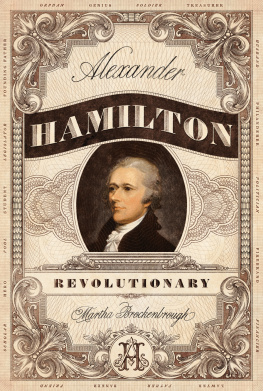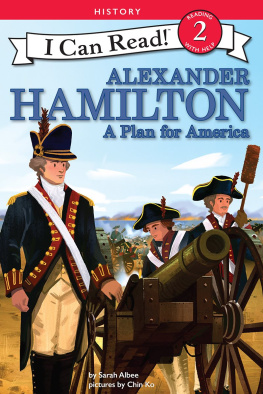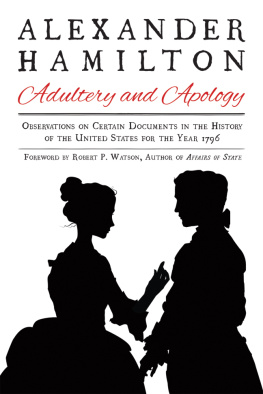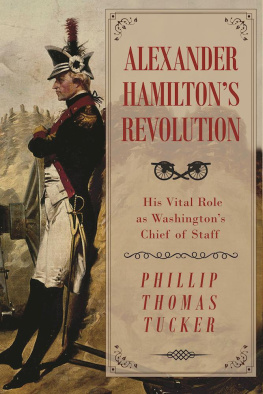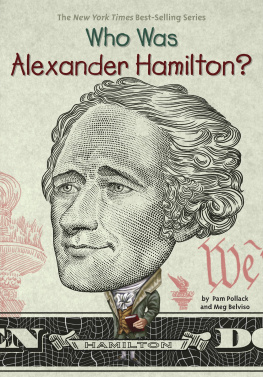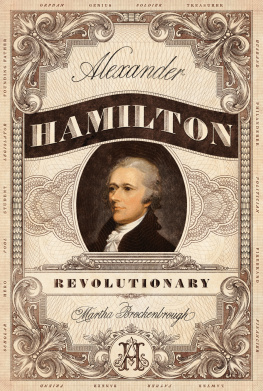Contents
Guide

The author and publisher have provided this e-book to you for your personal use only. You may not make this e-book publicly available in any way. Copyright infringement is against the law. If you believe the copy of this e-book you are reading infringes on the authors copyright, please notify the publisher at: http://us.macmillanusa.com/piracy.
T O A LICE ,
WHO HAS THE HEART
OF A H AMILTON
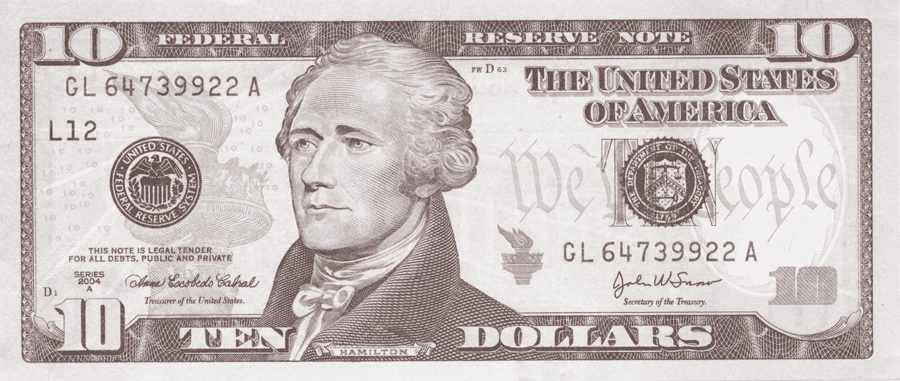
EVEN IF YOUVE HAD THE good luck to hold a crisp $10 bill, youve probably never studied the portrait on it or thought much about the man it depicts.
HAMILTON, the bill says.
Hes famous now, thanks to a Broadway musical. Before that unlikely thing happened, Alexander Hamilton had become a historical footnote. He even nearly lost his place on the $10 bill. This isnt all that surprising. During his life and afterward, people misrepresented much of what he did and believed. But his workoften criticized and misunderstoodwas genius. The United States simply would not be what it is without his visionary thinking and writing. Indeed, without his courage and wits, the Revolutionary War might not have been won.
Alexander was a warrior: fierce, brave, and more than willing to die for the cause. He was a strategist who, despite his youth, became George Washingtons right-hand man. He was a philosopher who helped the rest of the Founding Fathers figure out what theyd meant with their declaration, and how the Articles of Confederation could be turned into a constitution that would endure. He laid the groundwork for the nations economywhich was more controversial and complex than you could imagine. He founded the Coast Guard. The Customs Department. The Bank of the United States.
From the start, his life was complicateda study in contrasts.
He was born in a place both beautiful and terrible.
He was an orphan and, worse at the time, a bastard, which meant he could not go to school with the rest of the boys.
But he was brilliant. Studious, hardworking, and brave, and people rallied to his side again and again.
He was a loyal friend. He was a forgiving enemy.
He was a fearless soldier. He was an indispensable military bureaucrat.
He doted on his wife and children. He cheated on them.
He wrote sensitive love poetry. He wrote blistering political pamphlets.
He saved a man accused of murder. The man who helped him do it shot him to death.
He was a scapegoat. A scholar.
Respected. Reviled.
A genius. A fool.
A penniless nobody who became one of the worlds most powerful men.
He believed in the rule of law. He lost his life in totally illegal fashion.
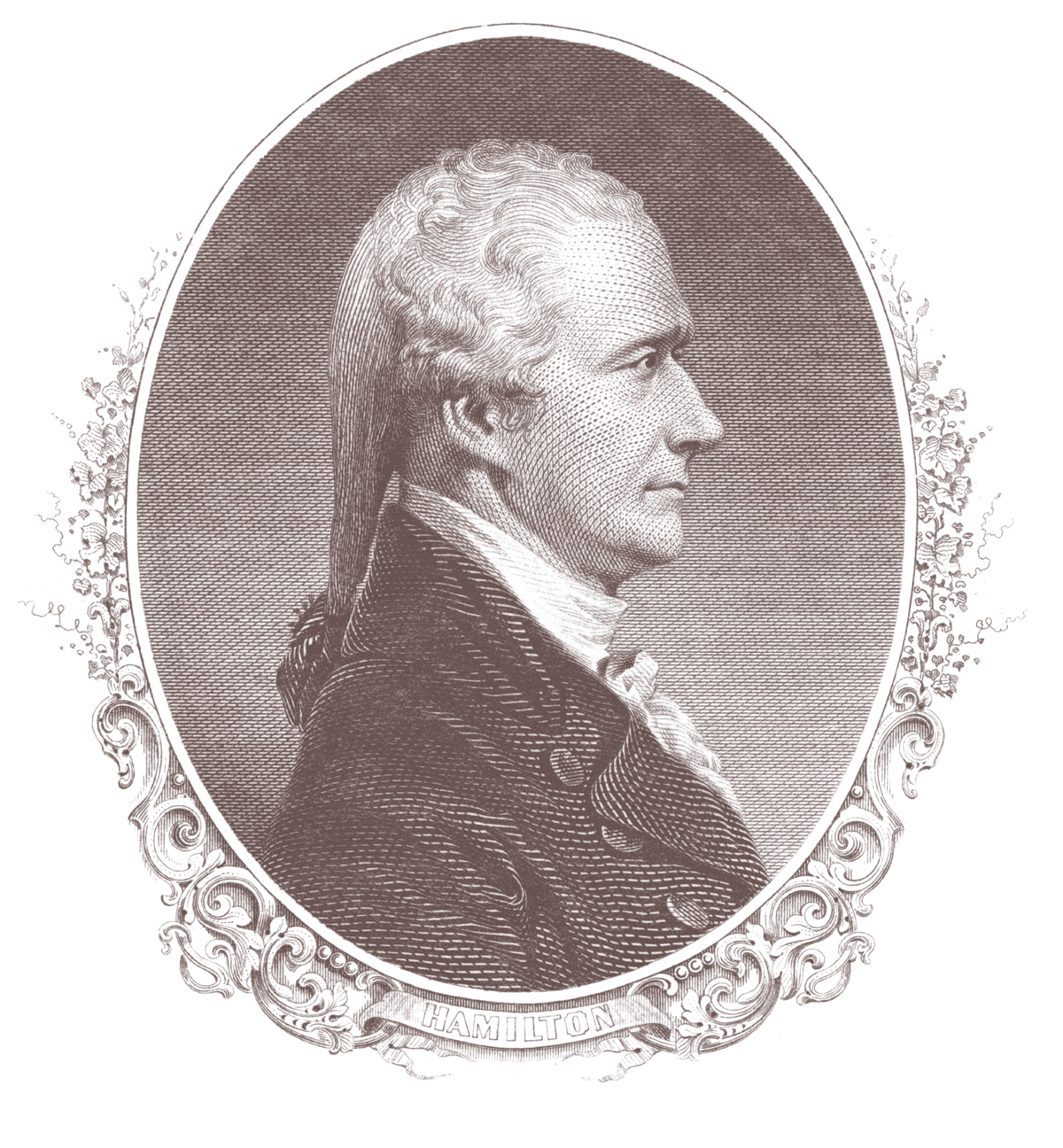
A LEXANDER H AMILTON.
H E WAS COMPLICATED.
T HIS IS HIS STORY.
ON THE LAST NIGHT OF August in 1772, as twilight descended on the island of Saint Croix, Alexander Hamilton thought he was going to die. He was still a boy, and he wanted to become so much more. He wanted to matter to the world. He wanted to be a man of courage and honor. He wanted to love and be loved. Instead, bracing himself against the winds of a hurricane, he waited for the blow that would end it all.
The storm tore homes and buildings off their foundations and sent wooden beams flying. It tossed huge stones a hundred yards and leveled a three-foot-thick wall around the storehouse of the king. And it wasnt just the wind. There were waves, too, huge ones more than seventy feet above their normal size. They flung ships a hundred yards ashore. Thunder boomed, and lightning lashed the sky, which spattered Alexander with torrents of salty rain. The air itself reeked of gunpowder and sulfur.
When the storms eye opened over the island, the wind let up, but in an hour it returned with a vengeance from the southwest. The storm felt otherworldly in its power, as if Death himself had wrapped a cloak around the sun and pounded the planet off its axis with his scythe. All around Alexander, entire families ran screaming through the streets. Earthquakes and tidal waves punished the surrounding islands. No one had seen anything like it.
Alexander expected that he and everything around him would be obliterated at any moment.

O N A UGUST , 31, 1772, A HURRICANE PUMMELED THE W EST I NDIES AND CHANGED A LEXANDERS LIFE.
Even after the storm ended, the suffering did not. Mangled bodies lay all around. Many survivors had grievous injuries. Homes and businesses had gone to wreck, and hungry children clung to the knees of their weeping mothers. There was no food. No shelter. There wasnt even good water to drink; the storm had made it too salty. Alexanders heart bled for these women he could not help. But what did he have to offer? He was poor himself. Fixing this was beyond his abilities.
He sought comfort in church a week after the storm, and a man named Hugh Knox stood to give a sermon. Alexander knew Knox well. Hed helped Alexander publish his first poems and had given him access to his library. Now, inside the church, Knoxs words about God soothed and inspired Alexander. On the wings of this divine energy, Alexander picked up his pen and wrote his heart out to his father, describing the destruction and the aftermath, and what these things signified for humanity.
I T BECAME A TURNING POINT IN A LIFE THAT HAD BEEN UNLUCKY FROM THE START.
Even if it wasnt enough to bring back his father, the letter was the best thing hed ever written. It became a turning point in a life that had been unlucky from the start.

S EVENTEEN YEARS EARLIER , A LEXANDER HAD been born on Nevis, a steeply canted volcanic island not far from Saint Croix. His birth was so unremarkable that no record survived. But it took place on January 11, 1755, in a house on the main street of Charlestown, the islands capital. The house gave his family a view of the blue-green Caribbean Sea pounding sandy beaches made of pulverized coral and volcanic rock, along with all the commotion of trade in the harbor.

N AMED LAND OF BEAUTIFUL WATERS BY INDIGENOUS INHABITANTS , N EVIS IS A SMALL, VOLCANIC ISLAND WITH SANDY BEACHES MADE OF CORAL AND PULVERIZED LAVA.
N EVIS WAS A HARD PLACE FOR A LEXANDER TO GROW UP .
Nevis was one of the sugar islands of the West Indies, which during Alexanders time played a major role in the worlds economy. Everybody wanted sugar. Fortunes were made trading it. A lot of people grew to depend on it, and the sugar from Nevis was the sweetest of all, even as it required the work and suffering of vast numbers of enslaved Africans.

